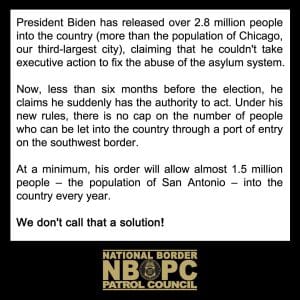Thursday, April 11, 2013
By Connor Radnovich
Cronkite News
WASHINGTON – Border Patrol agents told House members and congressional staffers Thursday that this is the worst possible time to cut the agency’s budget as the country clamors for immigration reform that includes a secure border.
But the automatic federal spending cuts known as sequestration could take the equivalent of 20 percent of the patrol’s manpower at the border through furloughs and elimination of overtime, they said.
“By decreasing the number of agents in the field, we’re creating holes. And with those holes, drug smugglers will exploit them,” said Brandon Judd, president of the National Border Patrol Council.
The cuts were scheduled to take effect April 7, but were put on hold by Customs and Border Protection after Congress passed a budget that funded government operations for the rest of this fiscal year.
The delay was welcomed, but it is only temporary, said Rep. Ron Barber, D-Tucson, who arranged Thursday’s briefing. Judd said his council believes the reprieve is only good for the next few weeks.
“We can’t let this happen,” Barber said. “I think Congress’ responsibility is to stand up for the men and women who are protecting our border.”
Barber, whose district is one of nine that border Mexico, hosted the briefing so Capitol Hill lawmakers could better understand life on the border by hearing from those who are there every day.
Judd, a Border Patrol agent for 16 years who has worked in the Tucson sector, said he has seen the border environment change dramatically over his career.
He said there needs to be a balanced approach to security across the entire border, with a mix of technology and boots on the ground. But the threatened furloughs and loss of overtime would be the equivalent of cutting 5,000 agents from the border, he said, moving in the wrong direction.
“The environment that we’re currently under is a very dangerous environment with cartels that are doing all of the smuggling,” Judd said. “It would be disastrous if we give back the gains that we’ve been able to make over the last 10 years, especially in Arizona.”
Terry Shigg, National Border Patrol Council health coordinator in the San Diego area, said that agents face the normal stresses of money and family as well as job-specific stresses like long hours and dangerous situations. Add furloughs and loss of overtime pay and the consistently low morale of agents will only get worse, he said.
“For me, it’s kind of a betrayal to come at them and to come at their livelihood,” Shigg said of his fellow agents.
Judd said cutting hours will also hamper attempts at comprehensive immigration reform, since the public has been vocal that Congress demand a secure border as part of any reform package.
“This is the worst possible time we could even be talking about cutting the hours of our agents,” Judd said. “Do not cut the hours.”


